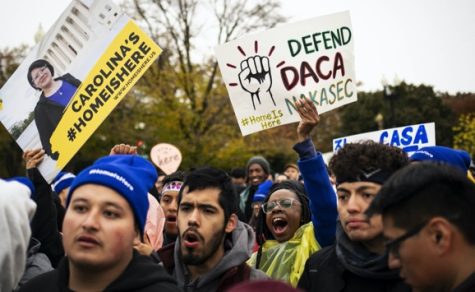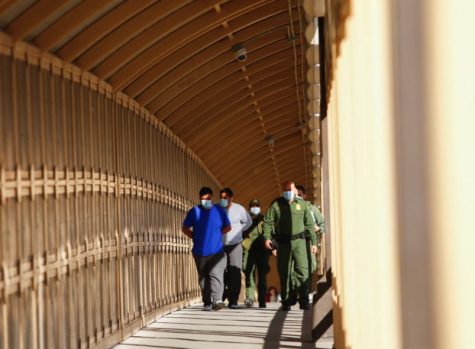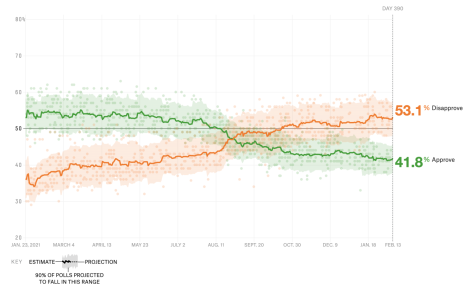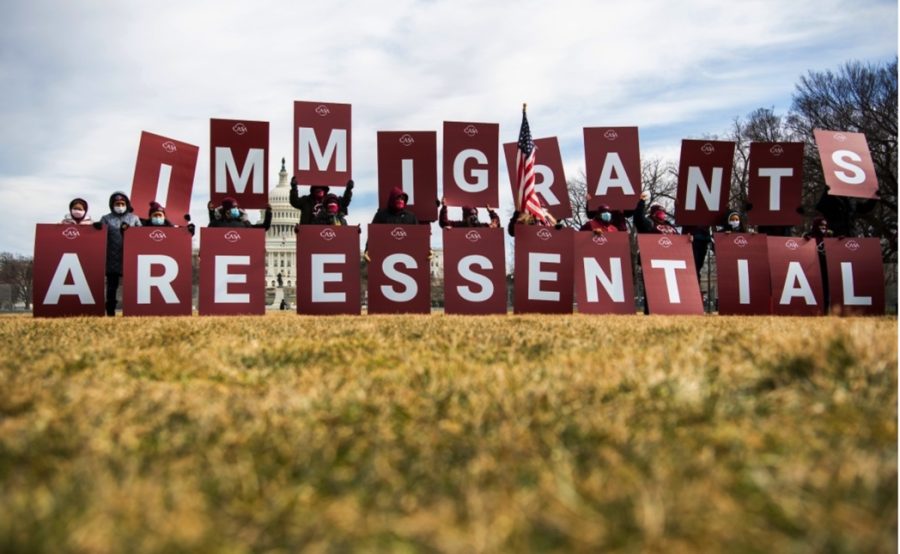Abuela, Biden, the Border, and Broken Promises
Introduction
My Mane Lilia, my grandmother, now in her eighties, came to the U.S. as a student—in a time when immigration from her home city of Matamoros in Northern Tamaulipas to Texas was far different. She came long before the heightened anti-Mexican racism of post-industrial America, when beleaguered and unemployed blue-collar workers began seeking new scapegoats for the nation’s economic woes, and politicians readily fanned the flames of their discontent.
She came before 9/11 and a century-defining program of “us versus them” xenophobia theatrics. Before we took to piling barbed-wire fences ever-higher on the borderline, obsessively retracing cultural, political, and physical boundaries in the name of “homeland security.” My abuela became an American before we extinguished the light beside Liberty’s Golden Door and bid farewell to the world.
During Thanksgiving of last year, she and I discussed my latest Keynote article, a comparison between Presidents Joe Biden and Jimmy Carter—and not a terribly positive one at that. I asked her what she thought of the President’s performance.
“No,” responded my abuela without a moment of hesitation. I was taken aback.
Most moderates and progressive to whom I’ve presented the very same query descend into awkward verbal deliberation—spoken-word poetry of pros and cons—often without a decisive verdict. Well, Biden’s done his best. And COVID died down for a little bit. That’s got to be worth something, right? He does seem old, though. And Afghanistan?
Indeed, judging the performance of a president in such an unwieldy social, epidemiological, geopolitical climate is no easy task. For my grandmother though, a life-long liberal who in-turn supported both Carter and Biden, words of earnest contempt flowed with an ease uncommon of dithering columnists and explosive television pundits.
“What else can I say but no?”
At the Heart of “No”
Such a forceful rejection of our embattled president’s conduct left me impassioned—not by her willingness to rescind once fervent approval, but rather by the reasoning she outlined to justify newfound criticism: immigration inaction.
“How can I support a president who hasn’t followed through on his promise?”
 As my abuela saw it, the fight for immigration reform was personal. Decades of national indifference or, at worst, demagoguery, solidified in her an intense commitment to the compassionate treatment of undocumented persons. For Americans like her living in border communities, the plight of undocumented immigrants hits close to home. Rather than statistics or political pawns, they’re neighbors and fellow parishioners, co-workers and friends.
As my abuela saw it, the fight for immigration reform was personal. Decades of national indifference or, at worst, demagoguery, solidified in her an intense commitment to the compassionate treatment of undocumented persons. For Americans like her living in border communities, the plight of undocumented immigrants hits close to home. Rather than statistics or political pawns, they’re neighbors and fellow parishioners, co-workers and friends.
When, under the avidly insular Trump Administration, fear of deportation among Latinos of all legal statuses rose to its highest level since the Great Recession, the need for sweeping systemic change became an unavoidable reality—for immigrants, their families, and their communities at-large.
How We Got Here
Believe it or not, there was once a time when GOP standard-bearers approached immigration policy with tact and resolved to view Mexico as an international partner in addressing illegal border crossings rather than a hostile state. The words of Pres. Reagan at a 1980 primary debate in Houston make clear the distance Republican ideology has shifted in the last half-century: “[r]ather than talking about putting up a fence, why don’t we work out some recognition of our mutual problems?”
With the outsized escalation of isolationism on the right, though, promises of change, of mercy, of policy that acknowledges the contributions and incommensurate suffering of undocumented families have dissapated. Whereas solidly conservative Congresses of the 1980s sought to grant legal status to millions of qualifying undocumented immigrants (most of whom came to the United States from Latin America), the brand of Republican legislation and leadership that came in the wake of 9/11 proved far different.
Since the late ‘90s and early 2000s, Republican control of Congress and the Presidency has heralded laws that both underscore border surveillance and place harsher restrictions on legal immigration to the US. Legislation like this, conflated with unapologetically xenophobic rhetoric on the part of far-right politicians like Pres. Trump, has driven the vast majority of Latino voters to Democratic candidates.

In 2016, before Trump’s victory and subsequent ascension to the presidency, 54% of registered Latino voters said they perceived the Democratic Party as holding the most “concern for Hispanic/Latinos.” Although that number has fluctuated over the last two decades, it does represent a larger trend. For Democratic politicians touting policies that purportedly parallel their priorities, Latino communities have been a reliable voter base crucial to election success.
DNC party platform states the following: “Democrats believe we need to urgently fix our broken immigration system—which tears families apart and keeps workers in the shadows—and create a path to citizenship for law-abiding families who are here, making a better life for their families, and contributing to their communities and our country.”
Now, a claim like that is all well and good—so long as the behavior of the party and its use of power when granted serves this goal.
All the Presidents’ Promises
In 2008, Barack Obama campaigned on revamping the US immigration system—and doing so with haste. Economic crisis, though, along with an unsympathetic congress, hampered his plans and cancelled a promise of quick, comprehensive reform. Four years later, in the 2012 election, Pres. Obama was once again carried to victory with a fervent Latino vote—despite having led a term largely unfurnished by immigration policy accomplishments.
Save for Deferred Action for Childhood Arrivals (DACA), a policy that enabled children brought to the US prior to the age of sixteen to remain in the country without fear of deportation, eight years passed without the sweeping reform he promised.
Biden, like Clinton and Obama before him, pledged to blaze a path to citizenship for millions of undocumented immigrants living in constant fear of deportation. He also vowed to immediately overturn many of the Trump-era border policies he and the Democrat Party have long considered inhumane. Not only has the Administration been unable to produce legislation for sweeping immigration reform, but it has fought to maintain the very Trump Administration policies it once criticized.
For months, the DOJ has been making the rounds in Federal Court to defend Title 42, a pandemic policy that permits border agents to separate asylum-seeking parents from their children upon arrival; immigrants’ rights groups have taken to condemning Biden’s inaction; and the President’s border policy advisers, once hopeful their work might foster real social and legal change, have begun quitting wholesale.
So, what’s gone wrong in the Biden White House?
Everyday Joe
First of all, with the pandemic continually extending its stay in American hearts, minds, and immune systems, immigration policy has taken a back seat—and understandably so. Though, as Biden wraps up his first year in office and public approval dwindles, it is plain to see that voters are dissatisfied with his performance—on all fronts, immigration included.

Whereas his early presidency portended an aggressive proposal for change, an invitation to Congress to consider immigration reform and a limited-time deportation moratorium, today’s administration appears rife with non-pandemic-oriented policy paralysis. Those lofty objectives of systemic change were dropped long-ago in the face of immediate pressures and internal disputes.
The recent departures of once-vital immigration advisors like Andrea Flores, Esther Olavarria, and Tyler Moran confirm a bleak roadmap for Presidential action on immigration. It is suspected that much of the discontent amongst Biden’s original slate of aides has stemmed from resistance in the upper-echelons of White House leadership (that is, security-focused figures like Susan Rice and Ron Klain) to policy overhauls promised by candidate Biden in the lead-up to 2020—in other words, from a rejection of the President’s original plans to overturn Title 42 and rehumanize the immigration process from the Executive.
Without energetic leadership on immigration reform coming from the Oval, the ball is really in Congress’ court. As in decades past, broad systemic change on immigration policy will have to flow from legislators—if at all.
A Path Forward[?]
It had been my hope to conclude this article with an optimistic glance toward the future, to discuss ongoing efforts in the House, the Senate, and White House and what kind of change we might expect to see as a result. As things stand presently, that doesn’t seem possible.
The Biden-backed immigration bill was DOA, Democrats have struggled to muster partisan support to back fundamental progressive legislation, and attempts to tag immigration relief measures onto the social spending bill have floundered at the will of parliamentary procedure.
In essence, a path forward for immigration reform is murky at best—in classic American fashion. I will applaud Pres. Biden’s early accomplishments (halting border wall construction and defending DACA), but disillusion is unavoidable.
 Failure on immigration isn’t just a reflection of Biden’s generalized struggle to achieve his policy goals. Rather, it’s a perfect stand-in for myriad long-term national struggles largely beyond the scope of a single presidency and yet too divisive for congressional consensus.
Failure on immigration isn’t just a reflection of Biden’s generalized struggle to achieve his policy goals. Rather, it’s a perfect stand-in for myriad long-term national struggles largely beyond the scope of a single presidency and yet too divisive for congressional consensus.
“No” Again
“No,” my abuela declared all those months ago at the Thanksgiving dinner table, a bulwark of political principle. While the rest of the country cyclically debates, digresses, and forgets the nation’s pressing multi-generational muddles, she remembers—and someday, so will history.

Lorenzo Ruiz, a senior, is a Coeditor-in-Chief. An enthusiast of government and current events, his hobbies include debate, Academic WorldQuest, Model...

